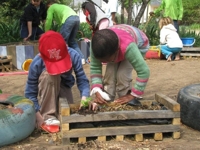 Over the last fifty years or so, “the world has changed a lot,” says Paul Clark, project manager for Knowledge Network®. “In rural areas there is a growing demand for resources that are… increasingly depleted. Meanwhile, knowing how to use computers and exposure to the internet is increasingly important. So we are combing these skills to improve the local environment and livelihoods.”
Over the last fifty years or so, “the world has changed a lot,” says Paul Clark, project manager for Knowledge Network®. “In rural areas there is a growing demand for resources that are… increasingly depleted. Meanwhile, knowing how to use computers and exposure to the internet is increasingly important. So we are combing these skills to improve the local environment and livelihoods.”
To help children—and adults— deal with their changing world, Knowledge Network® provides training in basic computer skills, graphic and web design, spreadsheet creation and use, and business skills. But Knowledge Network® also integrates issues like climate change, wildlife conservation and natural resource restoration into their lesson plans. And by partnering with schools, such as the Bedford Country School, Knowledge Network® is helping to bring these lessons to the young people who need them the most.
“A lot of the kids in South Africa come from very poor families,” explains Paul. “They are mostly worried about what is going to be on the table for lunch or dinner and many don’t have electricity or flowing water. Bedford Country School is in a farming community and the ability to grow what they need to survive and not destroy the environment while they do that is important.”
Part of what exacerbates poverty in the area, explains Paul, is that “the demand for local resources is growing but the resources are decreasing with pollution and urbanization.” Often farmers clear forests to make room for more farmland, and the water is contaminated from farm runoff and lack of infrastructure. “Soon the water in the area won’t even be potable or safe to use for irrigation,” says Paul.
As a result, the Bedford Country School, in partnership with Knowledge Network® is providing its students with the skills to take care of the water and land they need in order to feed their families, as well as preparing them for the technological demands of a world increasingly dependent on computers. “We supply the integrated lessons,” says Paul, “and the school then works these lessons into their learning program, often basing it on their own natural environment.” Bedford maintains a year-round garden on its grounds where the students learn basic farming skills. In addition to farming, the students take field trips out into the surrounding wildlife and farm land to learn about the importance of preserving the local natural resources—both for the health of the environment and for the wellbeing of their future livelihoods.
Back in the classroom, students learn to use the computer as a tool in order to do research, for example on improved methods of irrigation and other farming practices online, as well as how to put together PowerPoint presentations, Word documents, large posters, and other materials that they then use to present their new knowledge to the rest of the class and community. “The great part about this program,” says Paul, “is that kids can go out in the garden and actually plant the tomatoes. Then they can learn about the best way to keep the tomatoes healthy while also minimizing any damage to the surrounding environment. Then they can come inside and share everything they’ve learned with each other, gaining further skills in computer use that they’ll need in the business world.”
Paul says the program is improving more than just computer skills. “The students are really getting into the research and applying their new knowledge and it’s filtering down to every area. Their English and communication skills are improving, their math is improving and they understand that they can find answers and information online all on their own.”
As this project is successful at the Bedford Country School, the program is hoping to gain funding to grow and move into other communities that can benefit from it as well. Meanwhile, the students at Bedford Country School are sharing the resources they have and learning and developing their skill rapidly. “They are very young with so much in front of them,” says Paul. “It is amazing to see what they are achieving now and exciting to imagine what is ahead of them.”
To learn more about how schools are providing students with the information they need to improve the environment and their livelihoods through agriculture, see: Reigniting an Interest in Local Food, In the Classroom, “Trickle Up Education” to Improve Diets and Livelihoods for the Whole Community, How to Keep Kids Down on the Farm, and Cultivating a Passion for Agriculture.

Molly Theobald is a Research Fellow with the Worldwatch Institute working with the Food & Agriculture team on State of the World 2011: Nourishing the Planet. Molly brings her skills as former Labor 2008 Pennsylvania State Communications Director for the National AFL-CIO, and her experience working on women’s issues, to her research and writing for Worldwatch where she focuses on sustainable agriculture as a means to alleviate hunger and poverty in sub-Saharan Africa. She has a BA from Sarah Lawrence College where she concentrated in Women’s Studies and Social Justice.








